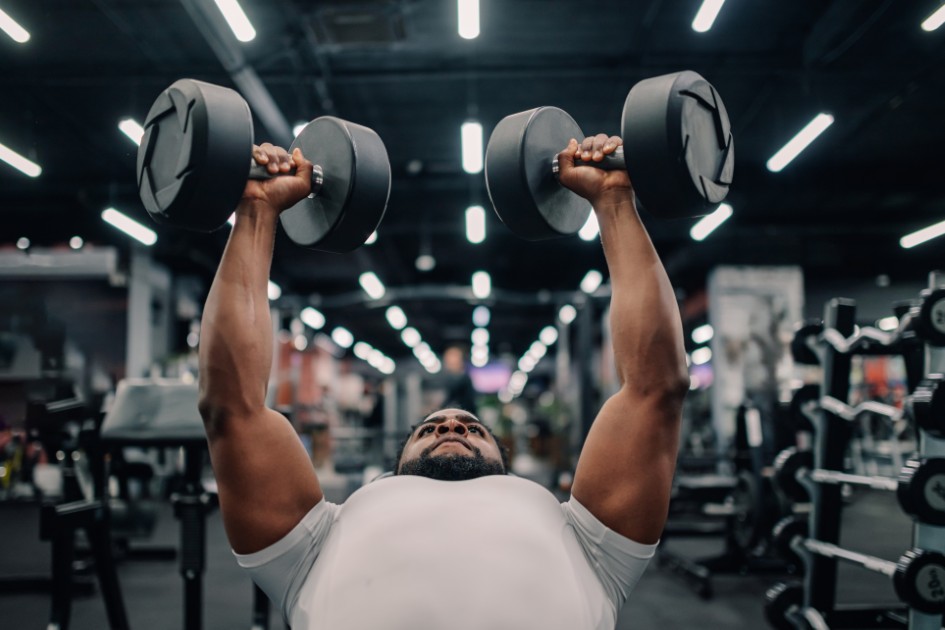Introduction: Every bodybuilder dreams of faster muscle gains and quicker recovery. It’s no surprise that human growth hormone (HGH) is often whispered about as a secret weapon in gyms. From competitive athletes chasing a podium finish to general fitness enthusiasts striving for personal bests, HGH promises the allure of enhanced muscle growth and fat loss. But does it live up to the hype? And at what cost? In this article, we’ll explore HGH in bodybuilding – taking a balanced look at the potential benefits versus the risks and side effects. By the end, you’ll have a clear understanding of how HGH works, the difference between natural and synthetic use, and the legal and ethical considerations surrounding it.
What Is Human Growth Hormone?
Human Growth Hormone (HGH) is a naturally occurring hormone produced by your pituitary gland. It’s essential for growth in children and helps maintain tissue and metabolism in adults. my.clevelandclinic.org. In practical terms, HGH helps build protein in muscles, break down body fat for energy, and keep your body composition in check. The body releases HGH in pulses, especially during deep sleep, after intense exercise, or when under stress. Levels peak during adolescence (supporting rapid growth) and then decline with age. This natural hormone also triggers the liver to produce IGF-1 (insulin-like growth factor-1), another agent that contributes to muscle and bone growth health.harvard.edu.
In a normal individual, HGH secretion follows a daily rhythm – more at night and after workouts – which means occasional blood tests for HGH are not very useful. Instead, doctors measure related factors like IGF-1 if they suspect a deficiency. Importantly, truly low HGH levels (growth hormone deficiency) are a medical condition that can be treated with prescription HGH. But what happens when healthy athletes start looking at HGH as a shortcut to more muscle?
Natural vs. Synthetic HGH in Bodybuilding
There are two ways HGH comes into play: naturally boosting your own HGH through training and lifestyle, or using synthetic HGH via injections. Understanding this difference is key:
- Natural HGH: Your body’s HGH production can be optimized naturally. High-intensity exercise is one of the strongest stimulators of growth hormone release, medicalnewstoday.com. For example, heavy resistance training or high-intensity interval workouts can spike your HGH levels naturally after the session. Sleep is equally critical – the largest pulses of HGH are released during deep sleep, so skimping on rest can blunt your muscle gains. Managing your diet and body composition also plays a role. Lowering excess body fat is shown to restore higher HGH output (obesity can significantly reduce HGH secretion). Likewise, keeping insulin levels in check by avoiding excessive sugar can help – high sugar intake elevates insulin, which may suppress HGH release medicalnewstoday.com. In short, clean nutrition, intense training, and good sleep are the “secret sauce” to naturally encourage your pituitary gland to pump out more growth hormone.
Pro Tip: Before considering any injections, maximize your natural HGH. Train hard, prioritize 7–9 hours of quality sleep, maintain a lean physique, and eat a balanced diet (moderate protein, lower sugar). These steps can significantly boost your muscle-building hormones safely and legally – no prescription needed!
- Synthetic HGH: This refers to laboratory-made human growth hormone (often called recombinant HGH). It is identical to the hormone your body produces, but it’s delivered from outside via injection. Synthetic HGH is a legitimate prescription medication for specific medical conditions: doctors prescribe it for children with growth disorders or adults with diagnosed growth hormone deficiency, muscle-wasting diseases, or certain syndromes. In healthy individuals, however, using synthetic HGH is considered drug abuse. You should never take synthetic HGH without a doctor’s prescription my.clevelandclinic.org. Despite this, some bodybuilders obtain HGH on the black market or through anti-aging clinics, hoping to accelerate their progress.
It’s important to note that taking synthetic HGH is not as simple as popping a pill. HGH is a large protein that must be injected, often daily or several times per week. This practice falls into the realm of performance-enhancing drug use (doping) when done for bodybuilding or sports performance. As we’ll see, while synthetic HGH can mimic the hormone’s effects, it also carries significant risks and legal consequences.
Potential Benefits of HGH for Bodybuilding
Why do athletes and gym-goers talk about HGH in such reverent tones? HGH has a reputation for being anabolic (muscle-building) and for aiding in fat loss. Here are some of the potential benefits often cited:
- Increased Lean Muscle Mass: HGH can stimulate protein synthesis in muscle cells, potentially leading to muscle growth. Clinical studies back up a small increase in lean body mass from HGH use. For instance, a review of trials in young athletes found that a few weeks of HGH injections led to about a 4.6-pound increase in lean mass on average health.harvard.edu. This suggests that muscles may grow in size or hold more fluid. Bodybuilders often notice a “fuller” look to muscles when using HGH. Additionally, in true HGH-deficient patients, therapy clearly increases muscle mass and exercise capacity mayoclinic.org.
- Reduced Body Fat: Another attractive effect of HGH is its fat-burning capability. HGH signals the body to break down fat stores (a process called lipolysis). Users often report easier fat loss or a leaner appearance. Research supports this – growth hormone treatment has been associated with a decrease in fat mass, especially visceral (deep abdominal) fat. In simple terms, HGH shifts the body toward using fat for fuel, which can help bodybuilders get that shredded look. This is one reason HGH is sometimes used during “cutting” phases to reveal muscle definition.
- Enhanced Recovery and Healing: Intense training puts stress on muscles, tendons, and bones. HGH may aid recovery by promoting tissue repair. There’s evidence that growth hormone and related peptides can improve wound healing and recovery from injuries. Some athletes feel that HGH helps them recover faster between grueling workouts, reducing soreness. While more research is needed, one older study even indicated HGH could help heal bone fractures and damaged connective tissue faster. Faster recovery means you can train harder and more often – a big plus for serious bodybuilders.
- Bone Strength and Other Benefits: HGH doesn’t just act on muscle and fat. It also helps maintain bone density and might give a boost to overall vitality. In medical settings, HGH can strengthen bones (helpful for those with osteoporosis or fractures). Aging athletes sometimes pursue HGH hoping for anti-aging benefits like improved mood or stamina. Some studies on older adults show slight improvements in bone health and quality of life measures with HGH, but this is an emerging area of research.
Despite these potential benefits, it’s crucial to keep them in perspective. The magnitude of HGH’s effects in healthy, athletic individuals is modest. Yes, HGH can make muscles bigger (at least temporarily) and reduce fat, but it is not a miracle drug for strength or performance. In fact, scientific trials with athletes found that extra HGH did not significantly increase muscle strength or aerobic capacity health.harvard.edu. Participants gained lean mass (some of which was likely just water retention), yet saw no improvement in lifting power or endurance. So, while HGH might improve your body composition to a degree, it won’t automatically turn you into a super-athlete. The body is a complex system; bigger muscles don’t always mean better performance if they’re accompanied by unwanted effects or if the muscle gain is not functional.
Side Effects and Risks of HGH Use
Using HGH – especially synthetic high-dose HGH – comes with a laundry list of side effects. These range from merely bothersome to downright dangerous. If you’re weighing the “rewards,” you must also consider the very real risks:
- Joint and Muscle Pain: Many HGH users experience significant aches and pains in their joints and muscles. This is because excess HGH can cause tissue growth and fluid retention, putting pressure on joints. Constant joint pain can actually limit your ability to train hard.
- Swelling (Edema): HGH often causes edema, which is swelling in the arms, legs, or face due to fluid retention my.clevelandclinic.org. Ever notice puffy fingers or sock marks on your ankles? That bloating isn’t just cosmetic – it’s a sign your body is holding too much water, which can raise blood pressure and strain the heart.
- Carpal Tunnel Syndrome: One notorious side effect is carpal tunnel syndrome, a condition that causes numbness and pain in the hands and wrists mayoclinic.org. HGH can make tissues swell, including those in the wrist, compressing nerves. This can be debilitating, making even daily tasks difficult (let alone heavy lifting in the gym).
- Blood Sugar Issues and Diabetes: HGH has a counter-effect to insulin, the hormone that lowers blood sugar. High HGH levels can lead to elevated blood sugar and insulin resistance. Over time, this increases the risk of developing Type 2 diabetes. Cases of new-onset diabetes have been reported in people abusing growth hormone. Ironically, a hormone some take for a “healthy” anti-aging boost might push them into a serious metabolic illness.
- Gynecomastia (Enlarged Male Breasts): Male bodybuilders have to worry about more than muscle size – HGH can cause gynecomastia, which is the swelling of breast tissue in men. This happens because excess HGH and resultant IGF-1 can influence sex hormone levels and tissue growth in unwanted areas. Gynecomastia can be both physically and emotionally distressing, often requiring surgery to correct.
- Increased Risk of Certain Cancers: Because growth hormone and IGF-1 stimulate cell growth and regeneration, there’s concern that they could accelerate the growth of existing cancer cells. Some studies have noted a higher risk of cancers (such as prostate or colon cancer) in people with long-term HGH exposure. While the data is still being studied, it’s a serious red flag – especially if you have any predisposition or family history of cancer.
- Acromegaly (Bone and Organ Growth): Perhaps the most alarming effect of long-term, excessive HGH use is acromegaly. This is a permanent condition where bones (like the jaw, brow, hands, and feet) and organs enlarge abnormally. High doses of HGH over time basically force the body to grow in distorted ways. Signs of acromegaly include coarse facial features, enlarged hands/feet, and organ dysfunction. This condition is not only disfiguring but also life-threatening – it can lead to heart disease, severe joint deformities, and other complications. Unfortunately, acromegaly caused by abuse of HGH is irreversible. No bodybuilder wants to achieve a great physique only to suffer an enlarged heart or crippling arthritis down the road.
- Other Risks: Because synthetic HGH is injected, improper use carries injection-related risks like infections or blood clots medicalnewstoday.com. There’s also the danger of dosing errors – unlike natural HGH, which the body regulates, an injected dose might be too high. Users have little way of knowing how their body will react. Also, many black-market HGH products are counterfeit or contaminated, adding unknown dangers.
In summary, HGH use is a classic case of “too much of a good thing” turning bad. The same hormone that, in normal amounts, keeps you healthy can wreak havoc when overloaded. The side effects can diminish your quality of life and put your long-term health in jeopardy – hardly a worthy trade-off for a bit more muscle or less fat.
Legal and Ethical Considerations
Taking HGH for bodybuilding isn’t just a personal health gamble – it can also be illegal and unethical in many contexts:
- Banned in Sports: If you’re a competitive athlete, know that HGH is universally banned by major sports organizations. The International Olympic Committee, World Anti-Doping Agency (WADA), the NFL, NBA, MLB – you name it – all prohibit HGH use, health.harvard.edu. Testing positive for HGH or its markers means disqualification and a likely ban from competition. Many sports have been marred by HGH doping scandals in the past (from pro baseball to cycling), health.harvard.edu. Aside from the official sanctions, there’s the personal cost: getting caught means public disgrace and a ruined reputation. Is a temporary performance edge worth throwing away your career and honor? Most athletes would say no.
- Illegal without Prescription: For non-athletes, legality is a big issue as well. In the United States, it is against the law to use HGH for any purpose not approved by the FDA, such as bodybuilding or anti-aging, mayoclinic.org. HGH is classified as a prescription drug; obtaining or distributing it for off-label use (like gym gains) is illegal. This means that if you buy HGH under the table, you’re breaking the law. Penalties can include heavy fines and even imprisonment for distribution. Other countries have similar regulations, often classifying HGH as a controlled substance. Beyond the direct legal risk, the fact that it’s illegal means quality control is lacking – you might not even get real HGH when you purchase it illicitly.
- Ethical Fair Play: Using HGH for performance enhancement raises ethical questions about fair play. In competitive sports, it’s considered cheating – enhancing your body beyond natural limits or what training alone could achieve. Even in the bodybuilding community, where some steroid use is common (though also illegal without a prescription), individuals have to consider the fairness and spirit of competition. Are you comfortable winning or progressing knowing it came from an unsanctioned substance? Some lifters also feel it undermines the spirit of bodybuilding, which is about personal discipline and hard work.
- Health Responsibility: Ethically, one might argue that we each have a responsibility to our bodies. Willfully subjecting yourself to significant health risks for vanity or accolades can be seen as irresponsible. There’s also the consideration of influence – competitive athletes or social media fitness influencers who use HGH may set a dangerous example that others follow. This community aspect makes the ethical landscape even more complex.
In short, HGH occupies a gray area at best and an illegal zone at worst. For competitive athletes, it’s a fast track to being banned. For recreational bodybuilders, it’s an expensive, illicit experiment with your health. And in all cases, it challenges the notion of competing with integrity.
Balancing the Risks and Rewards
At the end of the day, the decision to consider HGH – even just as a thought experiment – forces you to weigh short-term rewards against long-term risks. Yes, HGH has real, tangible effects: a bit more muscle here, a bit less fat there, perhaps faster recovery from injuries. For an elite bodybuilder or athlete, those might sound like the edge needed to win. However, the “price” of those gains can be extremely high. We’re not just talking about monetary cost (HGH is famously expensive) but the potential cost to your health, reputation, and peace of mind.
For competitive athletes: the choice is even clearer. Using HGH can disqualify you from the sport you love and dismantle years of hard work building your career. No medal or trophy is worth a lifetime ban. Competing “clean” not only keeps you within the rules but also lets you know that your victories are truly your own.
For general fitness enthusiasts: ask yourself what your ultimate fitness goal is. If it’s to be healthy, strong, and feel your best, HGH is a paradoxical shortcut – it might give with one hand (muscle) while taking away with the other (health). Focusing on natural training methods will yield more sustainable and safer results. Remember that there are no magic shortcuts in fitness. The physiques of top natural athletes are built on consistency, not just chemistry.
On a motivational note, consider this: part of what makes bodybuilding or any fitness journey rewarding is the personal growth that parallels the muscle growth. Overcoming challenges, sticking to a diet and training plan, and pushing past plateaus builds character. Relying on a drug to do some of that work can cheat you out of that personal development. There’s a reason many who have used performance enhancers report feeling a greater sense of accomplishment when they later achieve progress without them.
If you’re still curious about HGH or feel tempted, do your homework and talk to a healthcare professional or an endocrinologist. Get the facts specific to your situation. Often, once people learn about the real risks and the relatively modest benefits, they rethink whether it’s worth it. There may also be safer alternatives or supplements to help you reach your goals that a professional can guide you on. Your health should always come first.
Conclusion: Human Growth Hormone in bodybuilding sits at the intersection of science, ambition, and ethics. It offers a tantalizing promise of enhanced physique and performance, yet comes with serious downsides. By exploring both the upside and downside of HGH, we see that it’s far from a bodybuilding panacea. For most people, the smartest path is to harness your body’s natural growth hormone through good old-fashioned training, nutrition, and rest – a path that is safe, legal, and incredibly effective when done right. In the journey to build a better body, remember that quick fixes can come back to bite hard. Stay informed, stay dedicated, and you can achieve remarkable results while safeguarding your health and integrity. Your future self (and your body) will thank you for it!






